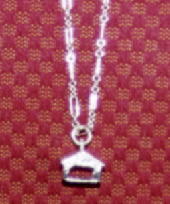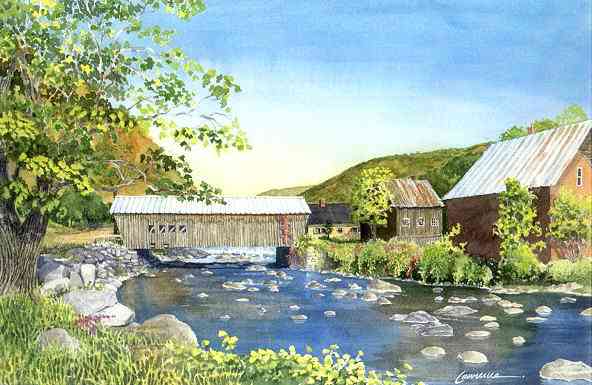
Mill Covered Bridge Rebuild: 2000
[WGN 45-09-09]

Mill Bridge Rebuild Index
- Mill Bridge Inspection Report In Brief: April 1993
- Mill Bridge Conversation with Phil Pierce: December 1999
- Mill Bridge Rebuild Begins: March 2000
- Mill Bridge Rebuild Continues: April 2000
- Mill Bridge Rebuild Continues: May 2000
- Mill Bridge Rebuild Continues: July 2000
- Mill Bridge Opening: July 22, 2000
- Mill Bridge: A Short History
- Mill Bridge Souvenirs
The Mill Covered Bridge Conversation: December 1999
The Mill Bridge Reconstruction -- Tunbridge, Vt.
Engineer Confident Bridge Will Be Ready For July 4
Purity of Construction in Replica Bridge Not Always Possible, Not Always Desirable
The Professional Engineer's Obligation
Friday, December 24, 1999 07:48 AM
Mr. Pierce: How is the Mill covered bridge replacement project going? Will the bridge be ready for the July 4 celebration? I assume the design is complete. Please send me some of the specifications; bridge dimensions (length, width, roadway), timber dimensions, timber species, and similar data for the web page. Maybe you have some insights on the challenges of working with a 19th century design.
Hoping to hear from you soon,
your friend in bridging,
Joe Nelson
Friday, December 24, 1999 11:25 AM
Hi Joe
We finished the design in the summer. Was reviewed by the Agency of Transportation and they did not find much to change. In fact they sent a very complimentary letter to the Town of Tunbridge about good plans and design. I was delighted with that.
My initial challenge was to design a bridge to basically duplicate the original with native hemlock. Unfortunately, hemlock allowable stresses are lower than needed to generally duplicate the bridge sizes. While a few timber sawyers were confident that they could find good quality timber, I was unsuccessful at finding any grading organization willing to certify that we could get enough Select Structural or Number 1 grade material to build the bridge with. This finding is not new and many criticize the engineering for not being able to duplicate original work. However, as a Professional Engineer, I must abide by certain standards that are nationally accepted and cannot set my own. If I did, and there was a problem, my professional reputation and licensure would never overcome the liability involved with such a flouting of accepted standards. I know of no other Professional Engineer willing to ignore such standards.
Therefore, after a complete design was prepared, we had to do it again with better quality materials. We settled on Southern Pine because it is available and a typical good quality product.
The contractor [Neil Daniels] ordered the material and has been waiting for it to dry before commencing work. I think he may be ready to go soon next year. He is intending to complete the work well before the July deadline, and I am quite confident he will.
As to the basic dimensions of the Multiple King post trusses, the basic total length is 72'-0" center to center of end posts. The trusses are 17'-0" center to center. We raised the entrance clearance to about 10'-0" to better accommodate higher traffic that routinely has hit the top of the bridge. Timber curbs are going to be installed at 10'-0" to channel traffic to the center of the bridge, thereby allowing the introduction of better knee braces. The previous bridge had virtually no overhead bracing and suffered for its lack. Stout tie beams and a good x top bracing system will help keep the bridge square.
The bridge is designed for a single 15 ton vehicle since a detour is readily available for heavier and bigger vehicles.
As I have noted on other occasions to lay people, I continue to look for the "hidden" sources of the reserve capacity that these structures obviously have. I have identified a topic that I am exploring with some of the leaders of the timber specifications industry. I have little confidence of being successful in making changes in the specs, but am trying.
Regarding other work, I hope to be underway shortly with design work for the rehabilitation of the Fuller Covered Bridge in Montgomery, VT. Still no notice to proceed.
Am completing the design and contract documents for work on the Hamden Covered Bridge in Delaware County, NY. This work was started by another engineer - I am picking up the pieces and completing it. Have found a special tidbit regarding Colonel Long's use of wedges that apparently hasn't been discussed by others. Will be good fodder for my book.
Am continuing to chase work with other covered bridges wherever it can be found. Will appreciate any plug you or others might offer.
Best wishes,
Phil
Friday, December 24, 1999 3:42 PM
Thank you Phil. I have been getting questions from people concerned with covered bridge reconstruction not using native timber and with using modern materials like glulam -- Your response answers that question, i.e. "professional standards," "national standards," and "reserve capacity."
Joe N.
Saturday, December 25, 1999 07:05 AM
Joe,
The one aspect to this topic that bothers me is the tendency of lay people to ridicule the engineering profession. While there are innumerable examples of bad engineering judgement, especially so with covered bridge work, I believe it is usually a function of a lack of experience and not an intentional lack of support for historical preservation. I have become very enthralled with this topic, starting with the challenges of the Vermont Statewide Study. Warren Tripp provided a lot of insight from their many years of dealing with a lot of covered bridges and he gave me the challenge of finding that hidden reserve. While we have spent a lot of time chasing all identified avenues, I cannot yet say I have succeeded. But I remain committed to continuing the search.
Just as I accuse lay people of ridiculing the engineering, I am sure that there have been many examples of engineers acting overly defensive - I may be subject to the same sensitivity. I try to react with honest explanations in an attempt to share my responsibilities which I take very seriously. Via my professional engineering registration, I have committed to serving society with mybest engineering judgement based on my initial education and my years of on-the-job training and research. If I take my responsibilities too lightly, I know I can kill people with poor judgement and engineering, by allowing my structures to prematurely fail.
I hope it becomes obvious that this topic is quite dear to me and will be a major feature in my book. I also hope that you are able to use this information and presentation to our mutual benefit in the further education of those interested in the preservation of these special structures.
Phil Pierce
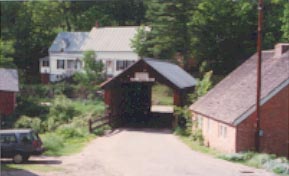
Photo by Joe Nelson
©1997
The Mill Covered Bridge Update: March 2002
Saturday, 25 Mar 2000
Hi Joe,
We had to go up to Canada to put some finishing touches on the Safari route. We also found out that Coaticook, Canada has a covered bridge, not listed in the Guide. It was damaged by the same floods that damaged the Montgomery,VT bridges a few years ago. They completely rebuilt it.
On the way back we stopped in Tunbridge and found them working on the new covered bridge. They had just started work on it on Monday. They have one truss laid out and I saw them install two counter braces. It looks like they are doing a great job. The Truss is of western Hemlock and the chords are Southern yellow pine. The foreman said that they were going to use native Hemlock, but Phil Pierce upped the dimensions, and they had to go west to get the size.

Photo by Dick Wilson
March 24, 2000
The Mill Covered Bridge Update: April 2000
April 14, 2000
I got home last night* at 11:00 after going 550 miles for the day. I'm sure glad I could meet everyone. Now I can put a face to those I write to. I enjoyed the day.
On the way home I visited the Mill Bridge in Tunbridge. The workers were gone. They have started work on the 2nd truss that they are building on top of the first truss. They have the steel beams across the river so they can move the new bridge across. The work seems to be coming along very well.
Dick Wilson
[*After attending the first Director's Meeting of the Vermont Covered Bridge Society in Cambridge, VT - JN]

Photo by Dick Wilson
April 14, 2000

Photo by Dick Wilson
April 14, 2000
Here is a close view of the multi-kingpost truss.
The Mill Covered Bridge Update: May 2000
Tuesday, 16 May 2000
Hi Joe,
Saturday we took a ride up to Tunbridge to see how the work was coming along. Both trusses are done and are upright. All the floor beams are in. Talk about OVERKILL. I don't think they should have used so many floor beams, but that's the way they spend the money! It looks good and will be able to hold a tank. here is a picture of the bridge. They are just starting the roof.
Dick Wilson

Photo by Dick Wilson
May 16, 2000

Photo by Dick Wilson
May 16, 2000
A view of the truss joint and floor beam.
May 19, 2000 - Says Dave Earl, a project coordinator for Daniels Construction: "...The verticals (king posts) are select structural douglas fir and the diagonals (braces) are dense select structural douglas fir....It was my job to count hardware and lumber, get pricing and order the material. It was quite a challenge....The project is ahead of schedule."
The Mill Covered Bridge Update: July 2000
Tunbridge's Mill Bridge Back in Place
Monday, July 3, 2000 - On March 5, 1999, after a two day struggle to bring in equipment to rescue it, the Mill Bridge was destroyed by river ice. On July 3, just sixteen months after the loss, a covered bridge crosses the First Branch of the White River at the Village of Tunbridge once again. Actual construction began during the first week of March, very nearly on the anniversary of the ice jam.
On Monday morning the new bridge sat ready on rollers. A four-sheave block and tackle attached to the bridge and to the near shore was stretched across the river between a pair of steel girders, the hauling line made fast to a windlass, or sweep, with several turns around its barrel.
One last chore and all would be ready; a crewman climbed to the gable-end to install the recently restored sign "One Dollar Fine for a person to drive a horse or other beast faster than a walk or drive more than one loaded team at the same time on this bridge."
At 9 a.m. Tom Mullen brought his team of oxen, Buckshot and Shorty to the sweep and began the circular journey. Three other teams of oxen took their turns as the bridge was inched across the stream. Contractor Neil Daniels worked with his crewman as they made adjustments and measured progress. The bridge's designer, consulting engineer Phil Pierce, watched from the crowd of onlookers. Five hours and twelve minutes later, after many stops and starts, screechings and groanings, and one startling bang! The bridge is in place.
The bridge will be officially opened to traffic with a dedication to take place on July 22. Meanwhile, The new bridge will be lifted onto bed timbers, the deck and siding completed and the steel girders removed.
The new structure is probably the fifth to span this place. Photographic evidence from the 1870's indicates that an open bridge served here before it was replaced by the bridge recently lost to ice. The house at the west approach has changed but little in outward appearance from those early years. The brick building beside the bridge was a blacksmith shop first established in 1791. The first bridge at the site was built in 1797 and destroyed by flood the following year. The replacement bridge served until 1815 and was followed by a third.
The fourth bridge, according to Euclid Farnham, was built by Arthur Adams in 1883 at a cost of $523.32. The timbers were prepared at the sawmill housed in the brick and frame building that still stands next to the bridge site. The new bridge, Built by Neil Daniels Construction of Ascutney, Vermont, cost $230,000.
For a brief history of Tunbridges Mill Bridge, click on The Mill Bridge Reconstruction - Tunbridge,Vt.
The new bridge is in place just sixteen months after the original was destroyed, possibly a record.
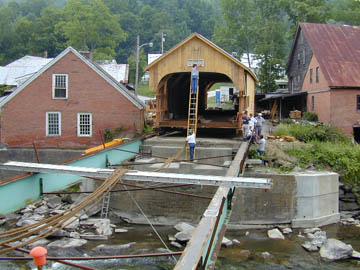
Photo by Joe Nelson
July 3, 2000
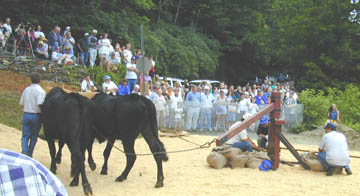
Photo by Joe Nelson
July 3, 2000
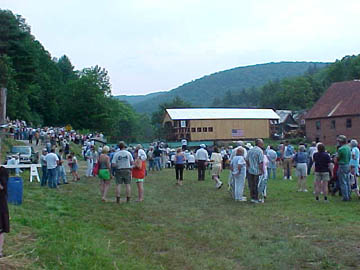
Photo by David Guay
July 3, 2000
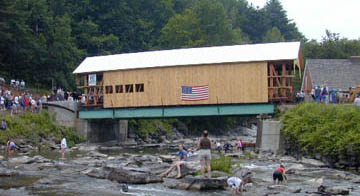
Photo by Joe Nelson
July 3, 2000
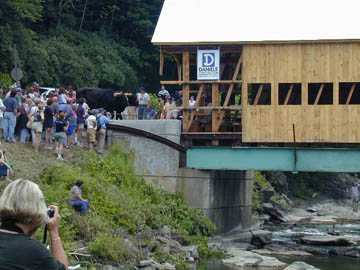
Photo by Joe Nelson
July 3, 2000
Tunbridge Celebrates Mill Bridge Opening
On July 22, 2000 Tunbridge celebrated the opening of a new covered bridge in the heart of the village's historic district. Friends of the old Mill Covered Bridge gathered for the ribbon cutting and a bit of pageantry. Euclid Farnham, author and Tunbridge Historian served as Master of Ceremonies while Dick Ellis' South Royalton Band provided the music.
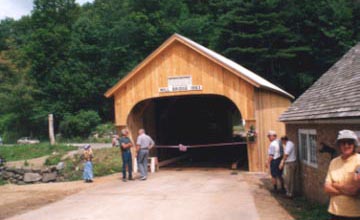
Photo by Jackie Higgins
July 22, 2000
The new bridge stands ready, ribbon in place, as the clock ticks toward 11 .a.m.
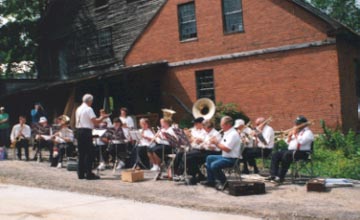
Photo by Jackie Higgins
July 22, 2000
The South Royalton Band plays a medley of tunes as the hour draws near. The saw mill where, in 1880, builder Arthur Adams got his lumber for the Mill Bridge stands in the background. Euclid Farnham opened the ceremonies with the Band's rendition of The Star Spangled Banner.
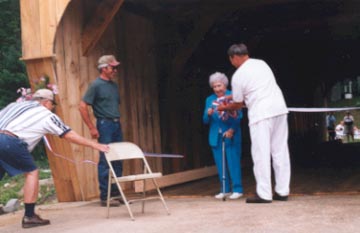
Photo by Jackie Higgins
July 22, 2000
Alona Litwick, at 92 the town's eldest resident, cuts the ribbon, officially opening the bridge.
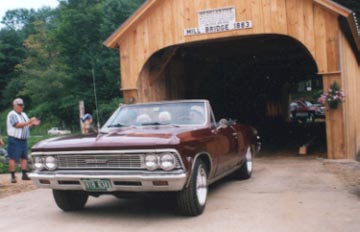
Photo by Jackie Higgins
July 22, 2000
Alona Litwick rides in a vintage Chevelle convertible, the first automobile to officially cross the bridge.
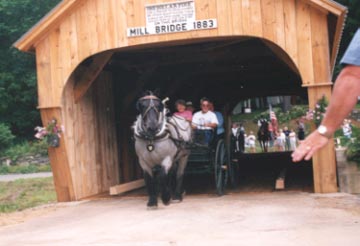
Photo by Jackie Higgins
July 22, 2000
As Euclid Farnham tells the story of the coachman notorious for running bridges, Shane Young, playing the part of the coachman, drives his rig through the bridge at a trot.
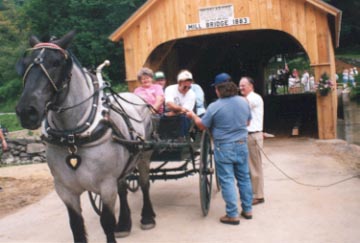
Photo by Jackie Higgins
July 22, 2000
The story continues as Dan Mullen, Tunbridge First Constable, steps forward to enforce the edict of the Selectmen: "ONE DOLLAR FINE for a person to drive a horse or other beast faster than a walk or drive more than one loaded team at the sam time ON THIS BRIDGE"
"Here is two dollars," retorted the coachman. "Cause when I come back this way, I'm going to run your ding bridge again!" Or words to that effect. And according to history, he did.
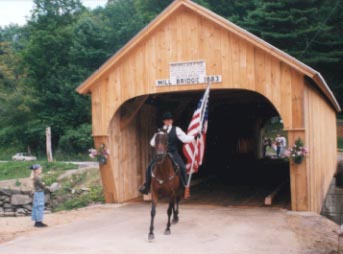
Photo by Jackie Higgins
July 22, 2000
Mounted color guard Lorri Berger walks her horse through the new bridge.
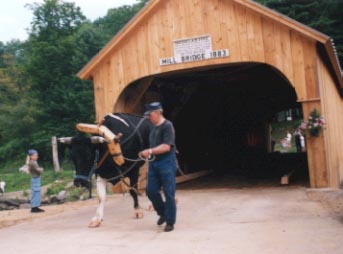
Photo by Jackie Higgins
July 22, 2000
Scott Guth leads his ox Jackson through the bridge that they had helped pull over the river last July 3.
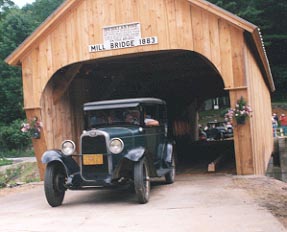
Photo by Jackie Higgins
July 22, 2000
Four pre-1940 vintage cars paraded over the bridge. Nancy and Randy Chapman cross the replica 1880 bridge in their 1928 Chevy.
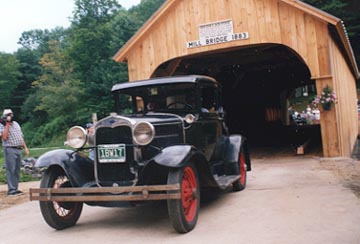
Photo by Jackie Higgins
July 22, 2000
Here Baxter Doty and Ernest Howe ride in style
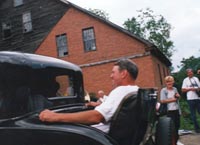
Photo by Jackie Higgins
July 22, 2000
Doug Giles, chairman of the select board in the rumble seat.
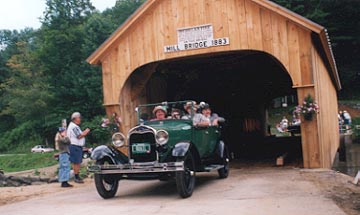
Photo by Jackie Higgins
July 22, 2000
Hale and Diane Mattoon, and Hilda and Buck Rogers cross in a Ford Model B open-top.
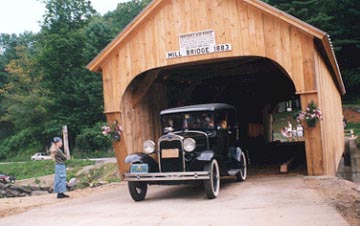
Photo by Jackie Higgins
July 22, 2000
Roger and Louise Sargent in their 1929 Ford sedan. Look closely and you will see one of their two stuffed bears riding in back.
Tunbridge Covered Bridge Fund Raising Projects:
The profits from the sale of these Mill Bridge souvenirs will be used to maintain all of Tunbridge's covered bridges.
A silver pendant replica of the Mill Covered Bridge, designed by a local artisan. Measuring approximately 5/8" by «" and accurately detailed down to the sign over the portal: "One dollar fine...." The pendants are being sold at the Tunbridge Library and at local stores for $30. They are available at state historic sites such as the Coolidge Homestead at Plymouth and other sites around Vermont.
The pendants are also available by mail: write to Marie Chambers, Strafford Road, Tunbridge, VT 05077. Add five percent sales tax for Vermont residents. Postage is $3.20 for priority mail. 14k Gold pendants, at $145, not yet available, can be ordered.
Tunbridge Covered Bridge Tee-shirts in sizes M - XXXL Emblazoned: TUNBRIDGE, VERMONT, they feature a picture of the Mill Bridge taken from an old color photo. Priced $12 each, plus $2.00 S & H. Order your Tee-shirt through Jackie Higgins, (802) 889-5521 or towntun@quest-net.com Attn: Jackie Higgins.
Also available, Tunbridge's Mill Bridge Prints from a watercolor painting donated by celebrated Vermont artist George Lawrence of Tunbridge. The painting is based on a slide by Euclid Farnham. The prints, 8" by 12" are priced $10 each, plus $2.00 S & H. Send your order to: Mill Bridge Fund, 24 The Crossroad, Tunbridge, VT 05077
